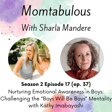Become a Creator today!Start creating today - Share your story with the world!
Start for free
00:00:00
00:00:01

All about Bullying - Save the drama for your mama (pt.1)
With Guest Amy Anichini, Bullying resilience coach and head honcho of Theatre of Peace - youth anti-bullying & empowerment troupe. We chat about parenting our own kids through being bullied, how it led us to create innovative ways to help today’s youth, resources and ways you can help your own kids, if they are dealing with bullying, and help them to open up to you with the big stuff! (part 1 of 2)
Resources discussed in this episode can be found at:
https://www.actlikeyoumatter.org/
T.O.P. Talks - How to Find Your Trusted Adults:
https://youtu.be/M_jc4sHNtwc?si=JJ7FFifP--hVjpvJ
Bullying resilience Coaching for Kids, Teens, & Families with Amy
https://www.actlikeyoumatter.org/bullying-resilience-coaching/
Transcript
Introduction to Amy Onakini and Her Mission
00:00:13
Speaker
Hello and welcome back to Mom Tabulous with Sharla Mandare. Today I have with me Amy Onakini and she is a bullying resilience coach. She's the founder of the San Diego nonprofit Act Like You Matter and the executive director of their division of theater of peace, youth anti-bullying actors and empowerment advocates. She creates age appropriate student led programs for kindergarten through 12th grade
00:00:42
Speaker
delivered on campus at San Diego County Schools and live streamed for students everywhere. All content focuses on demonstrating solutions, equipping students with tools and strategies they can use if they witness or are a target of bullying behavior.
Reflections on Friendship and Program Benefits
00:01:00
Speaker
And she's been a friend for a while. Amy, welcome.
00:01:04
Speaker
Thank you, Charlotte. I think we are going on 10 years of friendship at this point. Honestly, isn't that the coolest thing? And thank you for having me. I'm just so thrilled to be here with you and with your listeners and
00:01:18
Speaker
You know, not only am I hoping, you know, to share some tips and tools around this complicated topic of what do we do about bullying, but I am really looking forward to, you know, all of your future podcasts and being a listener myself. So, so cannot wait to see, you know, where this leads and what we all learn from each other.
00:01:37
Speaker
I'm so excited. You're my first guest. Awesome. All right. So with Theater of Peace and with Act Like You Matter, I love that what you do is done in a positive light, right? It's not like just an adult standing up there saying, bullying is bad and it's wrong. Don't do it. But it's the teen to teens, teen to kids, peer to peer.
00:02:01
Speaker
examples and so it allows the actors to step up as leaders and then it allows the kids to hear and learn from other kids who maybe have been through it. I know a big piece of why I think this works so well and why it resonates with schools.
00:02:16
Speaker
And we do, I appreciate that acknowledgement, and we do get that kind of feedback from schools, you know, at the administration level, at the teacher level, as well as at the student level.
Social Media's Role in Modern Bullying
00:02:29
Speaker
Like, they will tell us, you know, this is not like anything that we have seen before because you've got
00:02:35
Speaker
you've got kids up there and they get it. They've been through it and it's so funny sometimes kids will say well um adults have never been bullied so they don't really know so we're really glad that it's students up there and you know I think that's great that they think it's never happened to us too we can just kind of leave it. I think the difference is when it did happen to us there wasn't social media and there wasn't you know all of this stuff that it wasn't recorded and put online and you know stuff that
00:03:04
Speaker
that these kids have to deal with. And if you went home, and this is a conversation I have with my teen as well of like, look, if you're upset that your friends are all at this one house and you're not there, ignorance was bliss in the 90s, right? If my friends hung out without me, I didn't know, I was just home doing whatever I was doing. Now they're putting each other on the nap and they can see where everybody is all the time. And it's like, why?
00:03:31
Speaker
Do you do that? Why do you trap your friends? Because we're afraid of missing out on something. But I miss the days of, as you say, blissfully missing out on something. I mean, that was heavenly in a way. So let's talk bullying because this is, as I said, most people on the planet have had to deal with bullying on some level from a friend, a peer, someone in their class.
Recognizing Bullying: Signs and Resources
00:04:01
Speaker
even, you know, a teacher, you know, an adult, a dance teacher, someone, right? So how do, like, how do you know if your child is being, especially as they get older, they become teenagers, they don't want to talk to you as much, but how do you know if your child is being bullied? Like what are their warning signs? Is there something parents can look for? What, what should we do? Yeah.
00:04:28
Speaker
Honestly, it can be tough to tell, you know, short of flat out asking them. And sometimes even if you flat out ask them, they're not going to tell you, or they don't have the words to be able to tell you, or they might not even know themselves. What I like to suggest to parents that you might notice is that something has changed. There's something different about your child's behavior. And you might hear me use the word child. You might hear me use the word teen, but I'm, you know, referring really to the full age spectrum of, you know, our children.
00:04:58
Speaker
Something has changed. Something is off. Something isn't quite right. Something is a little bit different than it was before. And that is the perfect time, you know, to start up a conversation. I want to share a resource. Hopefully I'll get the opportunity to share
00:05:13
Speaker
you know, a lot of resources with you and your listeners today, but we have on our website, actlikeyoumatter.org. We've got a couple of resource pages, one for kids and teens and one for parents. And on both of them, we have one of my most favorite resources, which is stopbullying.gov.
00:05:30
Speaker
And stopbullying.gov is just a great sort of first stopping place if you are wondering, you know, if your child might be the target of bullying behavior. And they list nine different warning signs. I'll kind of rattle through them. And if I feel like it's taken too long, I'll paraphrase here. But here are a couple of things that they suggest that we can look for. Unexplained injuries, lost or destroyed possessions, like maybe they come home from school and their clothing is torn or they're missing.
00:05:59
Speaker
their phone or something like that. Complaints of illnesses on kind of a regular basis. Headaches, stomachaches, changes in eating habits. Like, for example, coming home from school hungry because maybe they didn't get to eat when they were at school that day. Difficulty sleeping, nightmares, declining grades, loss of interest in schoolwork, not wanting to go to school, sudden loss of friends, avoidance of social situations,
00:06:25
Speaker
feeling helpless and then kind of at the extreme would be you know threats of harming themselves or thoughts that you might have that they might be thinking about you know something like that.
Personal Stories and Escalation of Bullying
00:06:37
Speaker
Now, I know you know this, Sharla, but for the benefit of your listeners, our daughter was bullied. We have two daughters. Our younger daughter was the target of bullying when she was in second grade. And I will tell you, she had five out of the nine of these things that I just listed from stopbullying.gov. But it took us a while to, I wouldn't say it took us a while to notice, but it took us a while to realize
00:07:02
Speaker
what those were related to so over the course of the first three months of second grade she had some behaviors that started out being really subtle and then by the time we got to about thanksgiving they were so extreme that we thought our child had
00:07:21
Speaker
Anger management issues or oppositional defiant disorder or something like that because it really. Grew an expanded overtime and i want to share a few of the more subtle things in the hopes that maybe whoever's listening might realize that some of these things although they seem innocuous.
00:07:41
Speaker
are really great if they are different, they're really great times to sort of be the tip off to starting a conversation, right? So some of the things that I'll share that are a little bit more specific than what stopbullying.gov shared is that the very first thing was that she required longer and more elaborate bedtime routines before we could leave the room.
00:08:00
Speaker
Okay, you know, that could be nothing, right? Then she kept coming up with reasons to get out of bed and come down with various needs and things that just weren't quite right. In the morning, she didn't want to get out of bed. And then she stole getting ready for school. And then she said, oh, my stomach hurts or I have a headache. You'll notice very similar to some of the things that I mentioned before. And at school, she visited the nurse frequently.
00:08:28
Speaker
nurse could never find anything wrong with her. And, you know, things kind of escalated from there. We got into some academic things, like I would quiz her for a spelling test at home, and then she would go to school and fail the test. And she was fine at home. So there was this buildup. And then as we got sort of toward the end, where we realized that something really was going on, there were things like being defensive,
00:08:52
Speaker
When she was asked to do something sort of that's part of her daily routine, like, why don't you go brush your teeth? Stop picking on me. Leave me alone. You know, just this really quick. And then there were things like shouting to get things that she wanted, screaming at a family member.
00:09:08
Speaker
and even becoming physically aggressive with some family members. So you'll notice that the, and I'm giggling about it now, that's probably just nervous laughter. I mean, this is so many years ago. This child was seven at this time. She's now
00:09:25
Speaker
21 and a very happy college student who has ended up not allowing all of these things to to change her and she's living you know being true to herself and and who she is but you know we we got to the point where we we really didn't know what you know was uh was going on so so i would say when you notice those first few things something is just different go ahead and try to start a conversation with them about
00:09:55
Speaker
is everything okay, type thing. Yeah. And it's interesting, because all of these are things that I feel are so easily they just be written off, right as ocean needs a longer bedtime. Oh, she's just maybe there's just an age regression of a maturity, right? Where they they do this or not wanting to go to school. Well, what kid wants to go to school every day, right? You know, there's there are definitely things and you know, we've been through
00:10:18
Speaker
My child last year had a teacher that was a big, you know, issue and all of that was coming in play too. And I kept asking her, are the kids being nice to you? Yes. Are they, is anybody being mean to you? No. Are the kids, are the kids, are the kids? I wasn't asking, is there a teacher? And she was just answering my questions. You know, I was just saying, are, you know, are the, are the kids okay? I wasn't thinking well as this teacher, you know, and for her it was particularly math.
00:10:45
Speaker
She was at a middle school, so it was different teachers for different classes. So in math already, already is the issue, right? So it's interesting because as a parent, you can look at some of these and go, well, this is the reason, or that's the reason, or this would be normal, or they get more emotional. Well, yeah, we've got hormones. We've got all these, right? It's just we're in it. This is part of parenting.
00:11:10
Speaker
hard. So right and and for us we had this was a very sensitive child you know she just she loved you know family she loved but you know both her dad and me she loved you know having that close relationship so when those first few things started happening we were like oh my gosh this is so sweet she needs us she wants to spend a little bit more time with us you know until it got irritating the fifth time she got out of bed.
00:11:35
Speaker
So it does take a little while to notice. And I think, you know, no matter where in the process you start asking those questions, like those important questions that you asked your then middle schooler, it's always the right time, right? You know, so if you don't ask when the first, you know, five sort of subtle changes happen and you ask around the sixth thing that you notice, that's fine.
00:12:01
Speaker
You know, and that's good. You know, we're just, we're doing our best, but ask, right? And so the next question was like, you know, how do you, how do you start up the conversation? Sometimes you just got to ask, but like, what do you do when, you know, say they're in high school or middle middle school more and they're already so independent and they just want to be alone. And that answer becomes like, I don't want to talk about it. Everything's fine. Leave me alone. Like, I know everything's
Encouraging Communication and Staying Calm
00:12:27
Speaker
not fine. There's something going on and just talk to me.
00:12:30
Speaker
Just talk to me, mom, mom, dad, right? Like, just talk to me. We're a safe space. And I don't want to talk about it. Everything's fine. Leave me alone. How do you get something out of them? Yeah. It's such a simple question. And there's not exactly a simple answer to it. But I would suggest, and I know this is easier said than done, that you, first and foremost, respect their wishes.
00:12:59
Speaker
Spend your time if your child comes back and says everything's fine, nothing's wrong and you just know when you're gut that something is. I really do think that it's important for us to make sure that they're ready.
00:13:12
Speaker
to talk about it. So I would suggest validating their feelings and not waiting around for them to come to you because there are definitely things that you can do, which I'll touch on in a minute to help them feel comfortable about starting to talk to you about it. But one of the most important things that I want to mention related to this is that when someone has been bullied, they have been made to feel like
00:13:39
Speaker
their feelings don't matter. Their opinions don't matter. No one cares. Their just being, their existing doesn't matter. So we as parents need to do the exact opposite of that. You know, you are telling me you don't want to talk about it. Got it.
00:13:58
Speaker
That's fine. But I want to make sure that you know that I get it. You know, I understand, you know, that sometimes there are things that are difficult to talk about. And you can even say to them, you know, I get that when I ask you a question about a difficult topic, like is someone hurting you or someone mistreating you?
00:14:21
Speaker
that's a really hard thing to talk about because when you talk about it you got to think about it again and then you got to put it into words and you got to tell somebody and while you're doing that you're kind of reliving it and that's not fun.
00:14:34
Speaker
I can imagine some kids, depending on the kid, too, it's embarrassing, right? It is. Absolutely. And the other piece is, I feel like it's really important for us to be in the right frame of mind for this conversation. And that frame of mind, I'm going to suggest, is calm and level-headed. Now, when you suspect it's going on, there's a reason.
00:14:59
Speaker
There's a reason, you know, when you suspect that your child has maybe been mistreated, common level headed is like the farthest thing. You know, our mama bear and our papa bear takes in and we just want to protect our child and we want it to stop and we want them to go back to being happy and the life to be simple and, you know, all of that kind of thing. But if we approach this topic or any kind of big topic,
00:15:23
Speaker
in an emotional way, they're gonna get emotional too. And it's harder to talk about these kind of things when you're emotional.
00:15:31
Speaker
And they are going to potentially fear that because of our emotion and our, I want to fix the problem that we are going to run off and talk to somebody about it without their permission or before they're ready. And that's kind of huge. So they would rather shut down and suffer in silence rather than risk, you know, you and your emotional mama bear running off and, and,
00:16:00
Speaker
confronting the other parent or telling the school. And I mean, their fear is that you're going to make the situation worse. They just want it to, I think they maybe, maybe they think they've got a little bit of like the chicken little mentality. Maybe if I just ignore it, it's going to go away. And actually sometimes that works. Sometimes that does work. So I suggest, you know, you know, validate their feelings first. Let them know that they can trust you and you can even say to them, you can trust me. And anything you say to me,
00:16:30
Speaker
is not going to go past me without your permission. Unless, and we gotta throw the caveat in there, unless I have a genuine concern,
00:16:42
Speaker
for your safety or somebody else's safety. Like if I'm afraid that you might hurt yourself or that somebody else might hurt you or that kind of thing, then we get to a little bit more of a sense of urgency, still with our emotions intact, for how important it is to talk to somebody.
Involving Adults and Customized Approaches
00:17:03
Speaker
Because when something has risen to sort of a fear of physicality or
00:17:09
Speaker
that there there is physical aggression involved even though you know we call that physical bullying when kids are in school um it's technically assault so we it arises to a different level and it's how
00:17:26
Speaker
it's quite honestly, it's harder to get that kind of behavior to stop if you're a kid because there might be other motivations on the part of the aggressor that we're just not really going to be able to do much about until we get an adult or an expert or someone like that involved. Yeah. And so what do you
00:17:48
Speaker
Like, what can you do, right? Do you go to the school? Like, say that, like, you do have concerns, that this goes beyond just, my friend and I had an argument, and they said some mean things to me, and we're in a fight, and, you know, but you know, as a mom, that everything's gonna work itself out, which I've had, I've girls, so there was lots of girl drama with that stuff, right? You know, but beyond that, they are truly being bullied, and it is a situation. Do you go to the school? If they're parents that you know, do you,
00:18:18
Speaker
Talk to the other parents like what can we do? so we have this in a fabulous way and we you know, we feel that is we do need to go and Mom needs to step in and we're calm and we're cool and we're collected. What do we do?
00:18:32
Speaker
Yeah. And so I'm going to start off by saying that there's no, um, cookie cutter answer. There's no one size fits all solution. And, and it really does depend on a lot of different things, but before we start to talk about, you know, who you can talk to and who I suggest.
00:18:49
Speaker
that you talk to and who I suggest that you don't talk to. I will go back and say again that I would encourage, you know, anybody who is in the situation to use it as an opportunity to empower your child and teach them some life lessons. So I feel like the child tween teen should be the person who is sort of
00:19:14
Speaker
steering things. If your child is that kind of person who feels comfortable going to the adult in charge and I'll just touch on that real quickly. If the bullying happened on the soccer team, we're talking about talking to the coach or the head of the coaching organization. If it happened in the classroom, we're talking about talking to the teacher. If it happened, if it's someone outside of your class,
00:19:37
Speaker
could be the teacher, could be the school counselor, could be the principal. So there are any number of trusted adults, and we should probably talk about the term trusted adults at some point too. How much time do you have?
00:19:49
Speaker
So, you know, the appropriate adult, you know, in the venue or the medium, you know, where this negative behavior took place. So first and foremost, I love to see it when kids report the behavior. Another option would be talking to your student about your child, about them coming with you and allowing you to report the behavior. And they're there to sort of fill in as they feel comfortable filling in the details.
00:20:16
Speaker
And if they really don't feel comfortable with that, asking them for their permission for you to go to the appropriate adult at the venue, let's just say school to the teacher, to the principal, to report the the behavior. And, you know, I just I feel like it's, you know, while we really want the situation to
00:20:40
Speaker
be over and we want to move on. You know, anytime something happens in our lives or in the life of our child that's less than ideal, it's a learning experience, you know, and we can take the opportunity to talk about how we treat other people and what's an appropriate way to treat other people. And how'd you feel when that person treated you that way? And it's just, it's an opportunity for us to instill some life skills in our kids that they are,
00:21:08
Speaker
not only going to be using today, whether they're the ones that report the behavior or they're just there with you when you report it or they give you permission to report it, but
00:21:18
Speaker
they're going to use these skills when they're your age, when they're my age. I mean, bullying is all about trying to take away someone else's power or trying to have power over them. And if we can instead spin it in a way that we are reminding our kids of the power that they actually do have in the situation, that can really, that can turn it around and that can make them
00:21:46
Speaker
That can make them realize that just because someone says you're ugly, it doesn't mean that it's true. And just because someone says you don't matter and your opinions don't matter and no one cares what you think or whatever they might happen to say.
00:21:58
Speaker
You don't have to believe that, you know, and there are things, there are things that, you know, that you can do. So then setting those boundaries too, right? Of like, I want to allow myself to be treated this way too, right? Like, like you said, this is, they're going to have to deal with bosses they don't like and people they work with that are going to be, you know, the jerk that they work with that is possibly a bully and, you know, and standing up for yourself and, and doing it in the proper way.
00:22:27
Speaker
so it doesn't escalate it is a good life skill to learn. Yeah, it is totally. And I know you asked me a really important question and I don't want to drop the ball on this. I want to circle back around something that you said, do you talk to the other parent? Okay. If you obviously don't know the other parent,
00:22:45
Speaker
I would say I would not suggest walking up to them at school pickup like your kid, right? Um, but what if they're a friend of yours? What if it's like, you know, someone that you know, like you're comfortable with and you want to text with every once in a while and right. Right. And again, there's no, there's no cookie cutter solution. I would say trust your gut. You know, if it is another parent who, you know, and
00:23:10
Speaker
You know them well enough. I need to be careful about the way that I say this. You know them well enough that you feel pretty confident that they didn't learn this behavior at home.
00:23:26
Speaker
So if that's all true and you feel very comfortable with this other parent, I don't think there's anything wrong with talking to them. I do think you need to let your child know and yet their consent though, because it could end up escalating it or they might think it's going to end up escalating it. And that might make them behave in a way that makes them even more of a target, you know, that kind of thing.
00:23:50
Speaker
But let's go back to the other parent is a stranger and I, you know, you took the words right out of my mouth. I would say no. Please do not approach the other parent if you don't know them because research has shown that more often than not, bullying is a learned behavior.
00:24:10
Speaker
And many times it's learned at home. So you might be approach, intending to approach, approach this other parent in your calm, level-headed, respectful manner. And you might get hit with an escalated situation where the, there is retaliation against your child, or you find yourself on the receiving end of some kind of,
00:24:36
Speaker
Negativity so i just i'd steer clear of that yeah yeah definitely and at the end of the day this is about empowering our kids to realize that they can solve this situation.
00:24:54
Speaker
It's not necessarily about changing that other person's behavior, because that's really hard to do. It's really hard to change somebody else's behavior, because you have no idea what their motivations are, or where they learned this.
Reporting and Influencing Policy
00:25:07
Speaker
So if there are things that we can teach our students that they can do to right the situation, that's where I think we need to be spending our time. But at the end of the day, if there is something like this happening on the sports team in the Girl Scouts troop,
00:25:24
Speaker
at the community center, the Boys and Girls Club at school, it is important to get to that point where you're reporting it to the appropriate adult because they need to know what's happening on their campus. And then they can take that as an opportunity to look at the policies that they have in place. And are we really instilling in our students what we want to instill in them? So we could all benefit from reporting with consent.
Teaser: Addressing Your Child as the Bully
00:25:49
Speaker
We have so much we could talk about on this topic. We are going to do a second episode, so look for that. We're talking more about bullying, what to do, how to handle it, and what to do if you find out your child is the one targeting other kids. We'll see you in the next episode.



















